
|
In the year around to 30 AC, when the Roman Emperor was Tiberius, and Pontius Pilate was Judea's Procurator, a man, that Jesus of Nazareth, aged 36/37 years, was crucified in Jerusalem at the request of the Jewish Sanhedrin . From that day on, the cross has become famous, and the name of the Roman Procurator was indelibly associated to that historical fact.
SOME INFORMATION ABOUT HIM
In short, Pontius Pilate was a knight of the noble "gens Pontia", whose nickname ("cognomen") "Pilatum" means "man of the javelin" (from the latin "pilum"), being a military man proficient in handling weapons and especially the javelin. 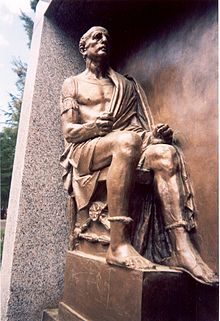
The more credited hypothesis then let him lowered by the noble Samnite family of Pontii, to which did belong Gaius Pontius Telesinus, the commander during the Second Samnite War, when the Samnites defeated the Romans in 321 BC
The emperor Tiberius, who belonging to the Roman nobility, had a to dislike Pilate enough to send him as Attorney in Judea, ungovernable and difficult environment because of the quarreling and fanaticism of the inhabitants. As well as belonging to a noble Samnite family, Pontius Pilate's had also married a woman of the Roman nobility, even the 'gens' Claudia, apparently going against the Tiberius advice.
The emperor sent him over there with strict orders to maintain order without provoking riots. Pilate was good as a soldier, but he was very little versed in administrative, diplomatic and political. The restricted environment where coexisted inhabitants of Judea, Samaria, of the Galilee and the various tetrarchies ruled by the sons of Herod the Great, and where the one does not take kindly to the others, was not to be easy to govern.
Knowing Tiberius, in case of an armed revolt and the consequent need to call the legions of Syria, Pilate would definitely have past many troubles.
Pilate, however, was dismissed by Tiberius after the death of Jesus, because the emperor had heard about preaching and miracles that Jesus had done and wanted to know Him.
Indeed Tiberius was very interested to esotericism and to the religions of the peoples who lived in the empire's territory, and became very angry when he learned that Pilate had allowed Jesus to be crucified.
|
 |
Claudia Pròcula - Pilate's wife -
 Pontius Pilate's wife is one of the characters of the Gospel story of the Passion. The Gospel of Matthew , only one to talk about her, doesn't name her, and only later the Christian tradition baptized as Procula, Procla , Prokla Perpetua or Pontius Pilate's wife depending on the translation. Procula is recognized saint in the Eastern tradition, because, following the vision she had on the eve of the trial, warned her husband not to condemn Jesus. In the Greek Orthodox Church, she is celebrated on October 27 and in the Ethiopian church June 25. Pontius Pilate's wife is one of the characters of the Gospel story of the Passion. The Gospel of Matthew , only one to talk about her, doesn't name her, and only later the Christian tradition baptized as Procula, Procla , Prokla Perpetua or Pontius Pilate's wife depending on the translation. Procula is recognized saint in the Eastern tradition, because, following the vision she had on the eve of the trial, warned her husband not to condemn Jesus. In the Greek Orthodox Church, she is celebrated on October 27 and in the Ethiopian church June 25.
She's known in the Orthodox Church as Saint Procula, Procla or Prokla.
The Ethiopian ortodox church celebrates both the saints Procula and Pilate June 25. The Ethiopian Church has canonized her as a saint in the sixth century, and Pilate because absolved himself from the guilt of the crucifixion. Right here's an icon Greek-Orthodox of Procula.
Her name is found only in the second St. Paul's letter to Timotheus 4,21. 'Make haste to come before winter. Eubulus, Pudens, Linus, Claudia and all the brothers' greet you.
This reinforces the fact that Claudia had become Christian, and that she had also heard in person the preaching of Christ.
|
 |
PALESTINE AT THE TIME OF JESUS CHRIST
Just under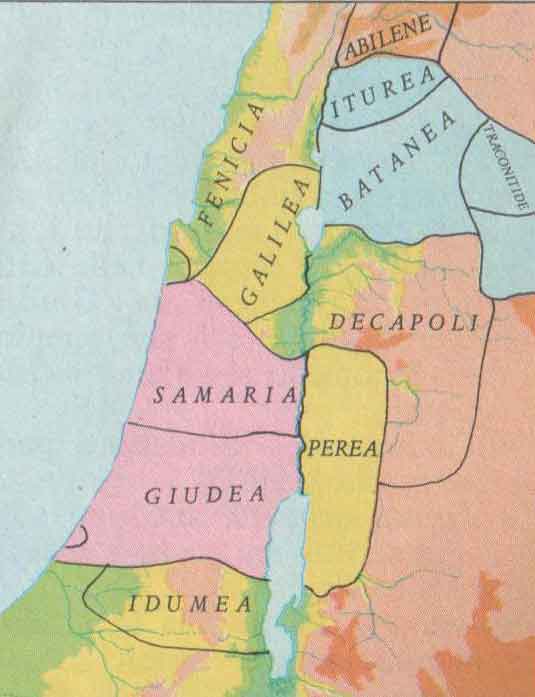 Phoenicia, that is the current Lebanon, we find Galilee, Samaria, Judea and Idumea. Starting from the north, there are met the eastern regions going down in Abilene, Iturea, Batanea and Trachonitis, Decapolis, and Perea. near the sea we find Samaria and Judaea. These place names we find them all even in the canonical Gospels. Phoenicia, that is the current Lebanon, we find Galilee, Samaria, Judea and Idumea. Starting from the north, there are met the eastern regions going down in Abilene, Iturea, Batanea and Trachonitis, Decapolis, and Perea. near the sea we find Samaria and Judaea. These place names we find them all even in the canonical Gospels.
Why did the Romans arrived in Palestine: in Palestine a series of different dominations: Babylonians succeeded in 540 BC, then Persians, and finally Greeks (333 BC), that is, the generals of Alexander the Great. The new rulers tried to kill the Jewish spirit. They even profaned the temple. Then broke out the revolt of the Maccabees who gave Palestine a few decades of freedom. Then, to make peace and put an end to the massacres and turpitudec of the Maccabees descendants, begged to intervene and called by the Jews themselves, in 63 BC came the Romans of Gnaeus Pompeus.
The infamy of the Maccabees' successors: a man, Alexander Jannaeus, had proclaimed himself King and High Priest. He killed more than 50 thousand men. It is said that during a lunch, to distract his concubines, he did crucify sixty men. At his death, a war broke out between his two sons, where also intervened Antipater, who ruled Edom on behalf of Israel. He was the future father of Herod the Great, who then ruled the entire region under the protectorate of Rome.
At the death of Herod the Great, was observed the last of his three wills designating Archelaus as the crown prince of Judea and Samaria, Herod Antipas as Tetrarch of Galilee and Perea and Herod Philip as tetrarch of Ituraea, Batanea and other adjacent territories, but It was necessary that the emperor Augustus approve these appointments. In the uppersaid subdivision many were opposing, chief among them was Herod Antipas, who in the previous testament was to become king of Judea, and also even some members of the Jewish clergy.
To argue their case, before Archelaus and then his opponent Antipas traveled to Rome. The Jews, always adverse to the Herodian dynasty, however, did not remain with their hands and decided to send a delegation of fifty members to request the emperor the cancellation of royal lineage and the annexation of Judea to the consulate of Syria .
Augustus didn't hear them but he tried to heal the conflicts into the family of the deceased Herod.
Archelaus got the government of territories as established by his father, but he was appointed only by the title of Ethnarch and not of King.
Antipas and Philip, remained Tetrarchs, and were assigned domains, but was pleased to have erased the hopes of their brother. The Augustus' political move was very wise, as he was sure to reign over the kingdom relying on the new rulers, as he had once done with the old Herod, or destroying them if they should fail. Archelaus ruled Judea, Herod Antipas the Galilee , Herod Philip the Batanea , Iturea and Abilene . Incidentally, Herod Antipas was the one who had stolen Herodias the wife to his brother Herod Philip, father of the infamous Salome.
Pontius Pilate was procurator of Judea and Samaria. but he didn't understand the Jewish mentality and had not tried to do anything to get in touch with its administered. But to get in touch with those people such the Israelites wasn't possible, there was a people that you couldn't anyway mix and assimilate to the Roman mentality, as instead almost the other peoples of the world did.
So in that Pilate would not have had successful experiences. Two facts of the government of Pilate in Judea are a key to understand his attitude during the trial of Jesus. The first: shortly after his arrival in Palestine in 26, performing an imperial order, he ordered the Roman soldiers who had traveled from Caesarea to the holy city Jerusalem, to introduce the banners with images of the Roman Emperor considered idolatrous by the Jews. He ordered that the soldiers were entering at night, to avoid a immediate clash, but to explain the signs the next morning, to finding Jerusalemites fait accompli.
It was an open challenge to the Jewish, who had obtained from Caesar the privilege of do not seeing the show of images of the Roman army, who represented the Emperor as a god.
In fact Rome proved to be more accommodating towards religious customs of her subjects, provided not touching the Empire's prerogatives (Flavius Josephus, Jewish Antiquities, XVIII, 3, 1, Jewish War, II, 9, 2-3). In this case, Pilate had to yield to the Jews that in his Caesarea praetorium for five days and five nights had pleaded the removal of the banners, saying that they were ready to die rather than suffer such an affront. |
 |
MILITARY FORCES ON PILATE'S HAND.
Rome was forced to fight to survive until the early days, and has created not only the better organized state, 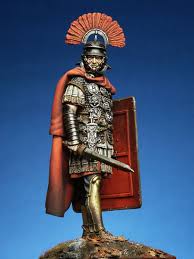 but also a military machine which no one resists, because no other army has its secret weapons : organization, stoicism , and discipline.Marching soldiers drink a mixture of vinegar and water; at every stop, the fields are fortified and supervised with rigor; in battle there are strict rules that all the soldiers observe until death, no matter what happens. but also a military machine which no one resists, because no other army has its secret weapons : organization, stoicism , and discipline.Marching soldiers drink a mixture of vinegar and water; at every stop, the fields are fortified and supervised with rigor; in battle there are strict rules that all the soldiers observe until death, no matter what happens.
To these virtues one can add the technological superiority of weapons, which are often manufactured by the legionaries themselves. Even the roads network allowing communications to anyone who wants to travel, was built by Roman legionaries, both during times of peace and to military campaigns.
Palestine is not considered important in the strategic empire's device , and throughout there are only about 3000 men.
The Eastern army is grouped northside to guard against eastern Parths and at south to keep outside the Arab looters.
Pilate therefore had to settle for a cavalry of 500 elements, and five cohorts of infantry. This is usually auxiliaries recruited in Samaria and Syria, and not of elite troops. In case of any real revolt must intervene the Syrian legions, based in Caesarea.
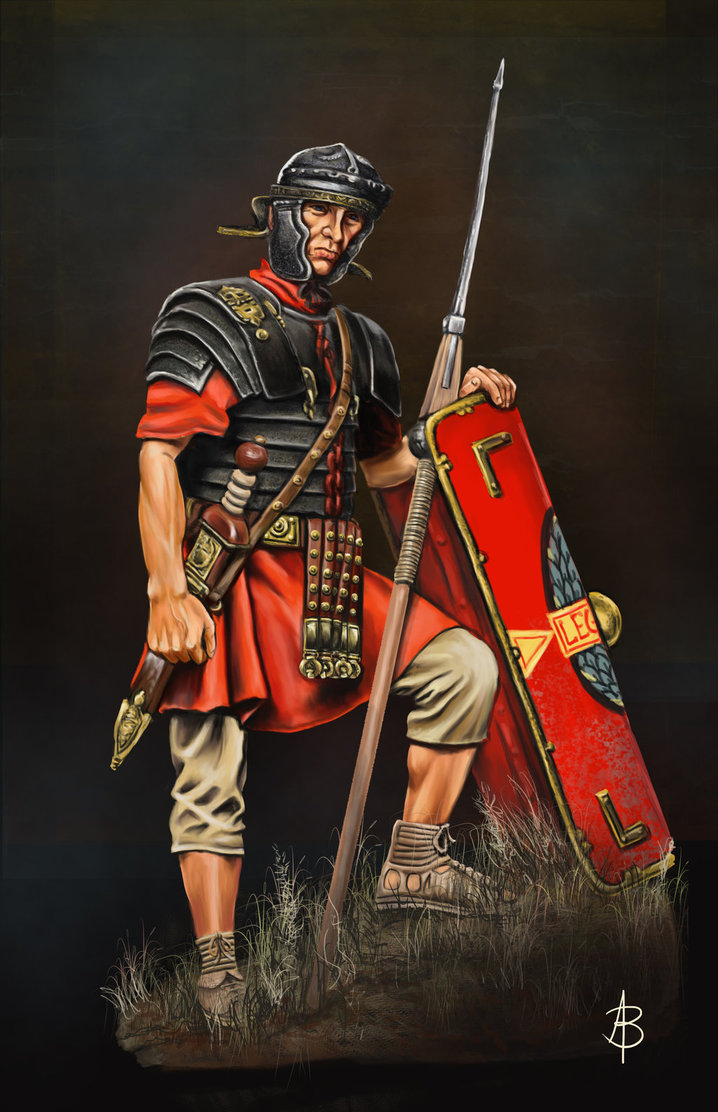
In Jerusalem there was only a Centuria of the so-called 'Italic Cohort', numbered around sixty veteran legionnaires commanded by a Centurion, that usually remained in the Antonia fortress and rarely showed themselves around .
This fact too tell us a lot about the Pilate's fear to spark riots and cause rebellion of the local population, which, however, was continually incited and instigated by the zealots. Practically, in Jerusalem the experienced and trained soldiers were too few to cope with serious riots, and the public order in the city was secured by guards and soldiers of the Jewish priests of the Temple.
Left Here : a veteran soldier of the Roman Army with his 'pilum' sword and shield
Upside. Centurion of the first century |
 |
THE MOST IMPORTANT EVENT FOR THE ENTIRE MANKIND: THE JESUS TRIAL
We all know what the Gospels refer, having heard to tell it always, every year, before and during the Easter season. Then It's needless to repeat it here. Let me just summarize some facts:
- The figure of Jesus of Nazareth worried very much the religious authorities in Jerusalem for the critical attitude of Jesus toward Pharisees and Scribes, but especially due to the turmoil that the teacher, coming from Galilee to the Passover, aroused among the people. Judean authorities were offended that he had repeatedly proclaimed himself 'son of God'; also feared that he wanted to proclaim himself the King of Israel, and the same fear also occurred between the rulers and local elites. The news that circulated about this teacher, who called to prepare for the coming of a 'kingdom of God' were not at all reassuring. The one and the others were, therefore, prejudiced against him. I personally believe that the motives of hatred for Jesus were the same for all: they were just reasons of power, although in different fields.
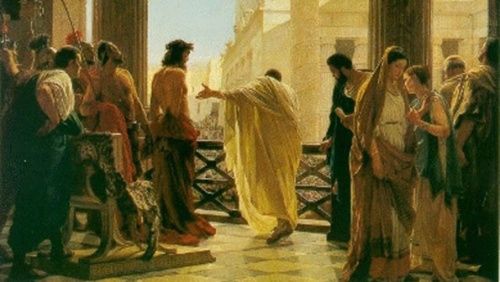
- For the Jews, understanding the Roman mentality was just as difficult for the Romans to understand the Jews. Perhaps more than the doctrinal issues themselves, what most worried the religious authorities was the fear that Jesus challenged the constituted authority. This, they thought the Jews Priests, could give rise to a popular agitation that the Romans would not tolerate. Moreover, many modern, including Europeans, and even very educated and prepared persons, but diverted by the Jewish influence in religious education, have never understood the Roman mentality. In fact the practical Roman mentality would probably have welcomed the advent of a new Herod the Great, who would rule on their own and paid tributes to Rome, leaving them free to confront Parthians and Arab raiders. The Romans would not have therefore failed to grope such an advantageous diplomatic line.
However, the Jews moved the cause before Pilate, bringing the litigation against Jesus in front of the Roman authority.
- For its part Pilate knew very well what were the reasons for which they had delivered Jesus: he knew that they 'had delivered him for envy' the Gospel says. Pilate therefore feared that both the religious and civilian authorities, if he had disgruntled them, could provoke riots that would ruin his image before the Emperor . The canonical Gospels do not say it, but what fool can think that a Roman Procurator should not follow carefully speeches and preaching of a 'revolutionary' character such as Jesus? How can we think that he couldn't know everything about Him before? The same Pontius Pilate's wife undoubtedly had followed the Jesus preaching, and maybe even had also supported Him with material contributions so much that then she herself became a Christian.
The logic of the facts is therefore as follows
- Only a fool would think at the time that the Jews could beat a strong armed and organized army as the Roman one. In fact many of the Jews were so mad and presumptuous as to think it, and decades after they paid the penalty.
- Jesus was not who believed Jews, Priests, Pharisees,Scribes and Zealots.
The Romans instead knew exactly who he was.
- Pilate, aware of everything by his spies, knew that someone was preparing a revolt, and that someone wasn't Jesus. Fearing the Emperor Tiberius' wrath in the event of an uprising that had forced the repressive intervention of Syrian legions, Pilate acted as he could. He tried to exonerate Jesus from accusations and to defend him, he thought that his followers would choose Him instead of Barabbas. At the end, desperate and frustrated, he washed his hands. And please tell me if you were in his trousers what would you have done. For the rest was Jesus who wanted to sacrifice himself for our salvation, and he yielded no ground for his defense.
|
 |
CONCLUSION
Even today there's an old prejudice against the Romans, the 'Gentiles'(*) oppressors, as well in the time of Gnaeus Pompeius the Great (here on your right) they were called by the Jews themselves to be freed by their king who massacred them. Then again repeatedly they went in delegation to Rome 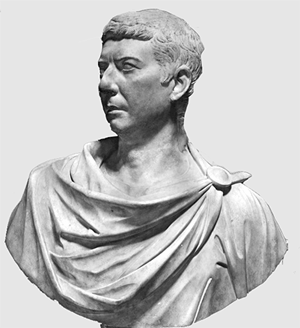 the last time after the death of Herod the Great, to ask the Emperor Augustus to cancel the royal lineage and the annexation of Judea to Syrian consulate. the last time after the death of Herod the Great, to ask the Emperor Augustus to cancel the royal lineage and the annexation of Judea to Syrian consulate.
The Romans in Palestine had built many great infrastructures, including the great strategic coastal road and secondary roads that allowed moving faster and easier; they protected the Palestine from Arabs and marauders, and from the Parthians invasions; the Romans themselves that ensured freedom of travel and trade in relative safety for most of the known world, were despised and hated by most of the Jews.
Instead Jesus Christ founded his Church on Peter, and made of the Greek-Roman world basically the new 'elect people'.
The Jews who also throughout their ancient history have contravened without brakes the God's precepts - just read in the Bible for example. the book of Kings - to the Romans show disgust, and do not want to 'contaminate' entering the Praetorium, on the grounds that their protectors were impure pagans and did not follow the precepts of the Law.
This is incomprehensible to the 'ecumenical' today's mentality, which for cultural reasons is much more like that of the Ancient Romans than to that of the ancient Hebrews, generally intransigent and intolerant fanatics.
However, in all probability, the Jews hated and despised the Romans, not so much because they were polytheists or ate food for them 'unclean' or not observing the Sabbath, but probably more for economic reasons.
In fact, in exchange for economic freedom and security of businesses insured with their protectorate and other works that they performed, the Romans demanded regularly a census of the population and demanded taxes, as they did throughout the empire, including Italy and Rome itself. To a Jew this was obviously something particularly nasty.
Let's forget certain relentlessly silly movies: I saw one about Jesus, where the Roman cavalry went around to steal and rape, and we lacked that they dispersed by coshes the crowd listenng to the mouintain sermon.
Similar products are clearly the birth of narrow-minded and bigoted people, but personally what I am rather surprised of, and that 'irritates me, it's like during some Sundays homilies ,many Catholic priests speak of Ancient Romans as crude occupiers an oppressors. They also call Pilate a vile and despicable man, whose cowardice sentenced death an innocent.
They do it due to monocultural ignorance of history, or to please some slyly idiot parochialism of today Italics?
Or, because they were educated in seminars where Marxists had infiltrated and camouflaged? They do it to dislike the Italian Risorgimento, to the united Italy who removed the Church's temporal power, to the bombastic rhetoric of the relatively short period of fascist government, or to the national hymn of Mameli? I couldn't say it for sure.
Just a few years ago I even heard a homily at the Church of Laives (BZ) that reported verbatim some nonsense read in one of the numerous bad books of some Anglo-Saxon writers: it was evident that the preacher was a careful reader of.
The fact is thatsometimes one still hears people saying that Jesus of Nazareth was killed by the will of the Romans themselves, fearful of don't know what, and that demanded the condemnation by the Sanhedrin; so it's tried to download a heavy responsibility that belongs exclusively to the Jews. The fact is that, while the Orthodox Church has even sanctified Pontius Pilate and his wife Claudia, the Jewish influence in the West, which is very strong in the Catholic Church too, it has instead given the image of cruel vile and despicable man .
In my ambit of small practicing Catholic, I try to forgive and pity everything, even some things that are not true, and even when certain priests act like the Pharisees, that is, as those that Jesus himself does not appreciate at all, as it is written in the Gospels.
I suggest to some priests of ours to change their style, because nowadays I see that many people move away from the faith. In fact, instead of explaining well the meaning of the Gospel they put the emphasis on secondary things, and more often false or misinterpreted, that have more relevance to the earthly kingdom than to that of Heaven.
News freely taken from: Encyclopedia Jesus (History of Christ) - Editrice SAIE, Turin
Note(*) how is that one gentle and refined man is called gentleman? These words come from 'gens' that is the Ancient Roman 'family'. For example Claudia Procula was of the Claudia family (Gens Claudia), and Pilatus belonged to the Pontia family (Gens Pontia). The Jewish today also call Gentle (Gentiles) who doesn't belong to their religion.
Lino Bertuzzi, August 2014
|
| CORRECTIONS AND ADDITIONS GLADLY ACCEPTED |
| |
| |
